Final Backward Glance: A Conversation with Aaron Bedard of Bane
“Keep those fists below the elbows,” Aaron Bedard says into the mic, addressing the jam-packed crowd in between songs of what will be Bane’s final show in Vancouver. “Groove with us… for the whole song.” Dressed in a plaid button-up with a baseball cap tucked low over his eyes, the 40-something frontman makes a fairly nondescript figurehead for one of modern hardcore’s most successful bands. That is, until the song starts, and Aaron explodes in a fury of raw energy, jumping around the stage and feeding the mic to audience members. Aaron’s commanding presence is somewhat at odds with his claims that his age is forcing him to slow down – the guy can definitely still bring it.
After 20 years of delivering relentless, uncompromising hardcore punk to audiences around the world, Bane is calling it quits. Rather than fade away, the band has decided to go out swinging, releasing a blistering final full-length album, Don’t Wait Up, and touring extensively to support it. Although it feels bitter to witness the end of such an important band, you have to give the guys credit for going out on their own terms – choosing your own path has been a staple of Bane’s lyrical message throughout their career. There is no discrepancy between walk and talk with Bane.
Aaron’s call for respect on the dance floor is another thing that sets Bane apart. In an era of fist-swinging, spin-kicking hyper-aggressive dancing, many concertgoers can be left feeling unsafe, alienated and excluded. “When we walk into this room, it should feel like home,” Aaron tells the audience, exhaling emphatically. This is the torch that Bane has proudly carried for the past 20 years – a blazing beacon of unity and acceptance. Being in the pit at Bane show, you truly feel like a part of something bigger than yourself.
I had the chance to sit down and talk with Aaron before the show, in the parking lot behind the mid-sized East Vancouver venue that the band would fill to capacity. As a light rain drizzled on us in the April twilight, Aaron and I discussed the meaning of hardcore, the connection between skateboarding and music and what a post-Bane future might look like.
How’s the tour going so far?
Aaron: It’s going very well. We’re a little over a week in. We started in Massachusetts and cut across the country. We did Toronto, Montreal, the shows have been great. A lot of kids coming out, and a lot of emotions surrounding this whole thing. This is the final Bane tour, and a lot of kids are coming out with some very nice things to say about what the band has meant for them. The shows have been well-attended and everyone seems psyched. It’s good.
When you started Bane, did you ever imagine you would still be playing 20 years later?
No. We joke about that. There is no way we ever, ever could have fathomed this. This is beyond all of our expectations.
The first time I saw you guys was with Strung Out in 2005 here in Vancouver. Do you enjoy playing for a non-hardcore audience?
Absolutely, we love that challenge. We’ve done tours with them, tours with Good Riddance, went out with Hatebreed once when they were just starting to blow up and played to a decidedly different crowd. We always like that. It’s nice to come home again and play small venues, but that is something that we always did thrive on, playing with bands that didn’t exactly fit into our genre.
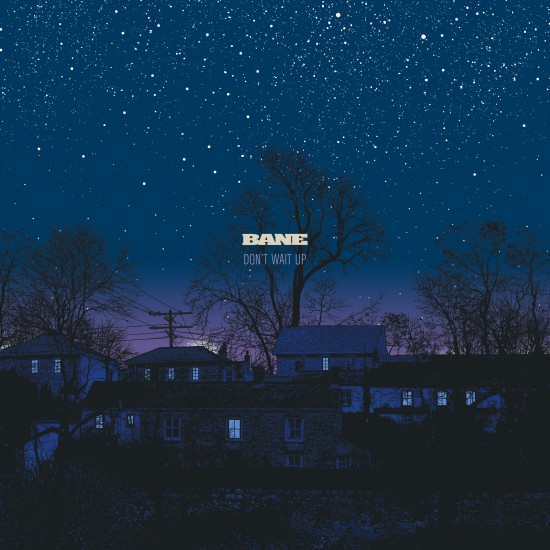
Throughout your 20 years with Bane, how have you seen the hardcore scene evolve or change?
That’s always a tricky question because it has a dual answer. Obviously, things have changed wildly with technology. Kids are maybe a little bit more entitled now, and maybe just spoiled rotten about how quickly they have access to everything, how quickly they can gain information. But another, more beautiful way that it hasn’t changed at all is that the basis of all of this is still built on youth and vibrance and anger, and that stuff doesn’t go away, no matter what happens technologically. Punk rock will always be about being rebellious and being angry and wayward. So, of course, it has changed in a million ways. Look at us, we’ve got a trailer now. We didn’t used to have that. We’ve got a GPS, we don’t have to print out maps anymore, touring has become easier. It feels like there may be more kids around now, on average, than when we first started. And it does stay the same.
Would you say that you are optimistic for the future of the genre?
Yes. I would say that things are as good now as they have ever been, as far as kids making really exciting bands and putting their hearts out there and really trying. I wish people would put out more published fanzines, that there was more of a physical aspect to the exchange of information, as opposed to just comment sections, but I do feel very optimistic that hardcore music is alive and thriving.
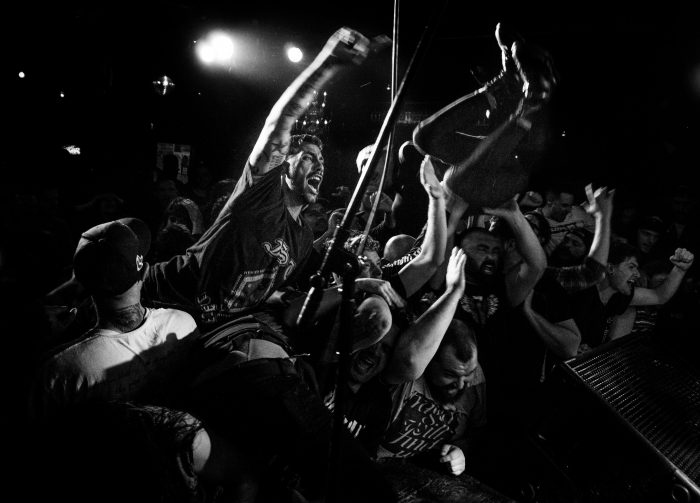
Photo Credit: Avrinder Dhillon
What are some bands the readers should check out?
Oh god damn, I really like Fury a lot. We played with a band on the first night of this tour from Washington, DC called Protestor who I really like a lot. The frontlines are crazy right now, lots of very young, very cool bands.
How do you picture your life turning out if you never got into hardcore music?
Oh man, that’s a real scary one, ’cause I have a really addictive personality. When I get into something I tend to really throw myself into it, and it scares me to think that if I didn’t find straight edge and a community that had so many positive vibrations, what I could have gotten into. I do think about that sometimes. Right before I found skateboarding, I was a pretty jocky, stubborn teenage kid. This settled me down and gave me a place where I felt I could breathe a little.
I’ve heard you say in a previous interview that hardcore asks more of you emotionally and intellectually than other types of music. Can you elaborate on that?
Yeah. The music is about more than just very basic subjects. We’re not talking about partying. We’re not talking about heartbreak or love as the main focus of what we are trying to do. We’re challenging people to think critically and I think that’s something that is lost in a lot of art forms. I like to think that hardcore was created to put kids through a decision, to draw a line in the sand and say, “Where do you stand on things?”
I also read recently a letter to your younger self that you wrote and was published online. It kind of sounds like, when you wrote it, you had wished you had done things differently in your life. Do you think there is any value in regret?
Well, I ended it with, “I know you’re not gonna listen to me anyways,” [laughs]. But I think that I have to say yes. I spend so much time sort of wallowing in it that I hope that I learned something from it and I become better because of it. I do spend a lot of time looking back and assessing the things that I wish I would have done differently, decisions I wish I would have made more strongly. So, I hope there is. But I also think that is a real personal issue with me, that I have a hard time being in the moment. I’m always either looking back or looking forward, and I don’t think that’s a good thing.
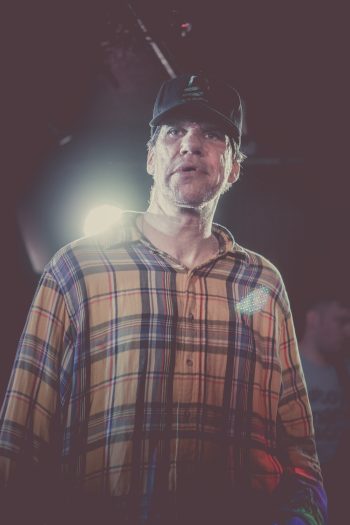
Photo Credit: Avrinder Dhillon
Do you view Bane as accomplishment enough in your life? Do you feel like there are goals you could have achieved outside of the music?
We did pretty good, to be completely honest with you. And I’m a guy that’s pretty tough on myself, but I think that we did pretty good and continue to do pretty well. The final record is a record that I’m really proud of. The way that we have sort of mapped this out over the last two years, we did OK. I can definitely look people in the eye when it comes to what we did with Bane.
A lot of your lyrics are either very personal or deal with issues within the music scene. You don’t touch on a lot of overt political topics. Is this a conscious choice or just the way the songwriting takes place naturally?
I can really only write about the things that are right on the top of my head. Deeper politics have always been hard for me to address in any sort of way that I would feel confident. It’s not that I’m not interested in what’s going on in the world, and it’s not that I don’t think it’s important to be politically engaged. I’m an American kid and pretty much every feature of politics to me has seemed pretty deceitful. I’ve never been able to align myself with any side. It’s like writing about life on Mars. They’re so far removed from anything that has anything to do with me. I don’t know how directly my life has been impacted by a Democrat or a Republican. I just know that they have all kissed enough ass in their lives to get the keys to the castle and now I’m just a number on a page to them. So I’ve tried to live my life giving them as little attention and energy as possible. Maybe that’s a mistake. Maybe I could have been more active in that stuff. But I found this instead.
In the song “One Life to Live,” you write, “I didn’t find God, and he didn’t come looking for me.” Do you think religion has any value in our society, and does it have any place in our music scene?
I can’t say there’s not value. I can’t say that having some amount of faith isn’t going to comfort people or give them sort of satisfaction. I think ten years ago, I would have answered this question much more directly and much more angrily, that absolutely not, punk rock and religion should never meet. That they oppose each other. But now I know kids who are Christian and I feel like my stance on that has softened slightly. My opinion on whether or not there is a God or if I ever want to be told what to do by some higher power has not changed. It does feel like a huge statement to say that you’re not allowed to be a hardcore kid and have that sort of faith. It just never resonated with me personally. It never made any sense for me to have somebody who I can’t look in the eyes tell me how I should be living my life, or what’s right or wrong, or where my moral compass falls. But if it works for some kid out there and he still loves Agnostic Front and The Cro-Mags, I can’t tell him he’s wrong.
As you mentioned earlier, you grew up as a skater. Do you ever get to push around anymore?
Naw. When Bane first started, after about five years off, I started skating again with the young kids who were gravitating towards our band. I found myself hanging out with kids in their early 20s who were psyched on skating and I did grab a deck, and it took about two weeks for me to have twisted my ankle twice, just completely fucking myself up. I just can’t do it anymore. I dislocated a knee when I was very young skating and that injury never quite healed. I was never someone who just tooled around. It was always about six sets and just going really big.
So it was mostly street skating?
For me, I never even really hit a ramp. It was all just about doing big gaps and big steps and fucking myself up [laughs]. And then when I got into Bane, I was already in my mid 20s, had the knee issue, my body just wasn’t gonna work. I still see a skateboard and still feel the urge. I still see spots around the city and want to skate them, but I haven’t been on a skateboard in a very long time. You skate?
Yeah. I try to every day.
I love that.
Do you think there is a connection between skating and music?
Oh, yeah. Articulating it is difficult to do, but aggressive, loud music and skateboarding, for me, met in the middle perfectly. But how do you explain that to an old person, how completely entwined they are? I think it has something to do with being young, energetic and passionate, and seeing something and feeling like you can take it down and overcome it. Skating made me feel very similar to the way Minor Threat made me feel, like the world was a challenge, and you had to push yourself to fucking manage your way through it. For me they coincided perfectly, and one probably could not have existed without the other to see me through my teenage years. I needed them both equally.
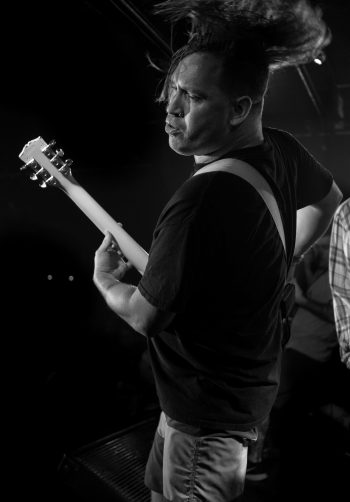
Photo Credit: Avrinder Dhillon
What’s next for you after Bane?
That’s the golden question I keep getting asked. The short answer is that I am completely unprepared for what it’s going to feel like to not be in Bane. This has been 20 plus years for me, the best years of my life. I don’t have anything to segue immediately into. But I’m a bright kid, I can think on my feet. I may do my best work when my ass is against the wall and I don’t have this safety net anymore. This thing always sort of kept me from throwing myself into anything else too heavily. It was always, “Oh, we’ve got this in six weeks, we’ve gotta go do this, do that.” It really kept me stagnant in a lot of ways, so part of the excitement of not having the band exist anymore is to see what comes of it and what the next challenge is gonna be.
Are you worried about finding a release for aggression?
Yes. Absolutely. I’m worried about the loss of all of this and so many different aspects of how it’s going to affect my calmness. Even just how it feels to be a kid walking into a room, what it’s going to feel like when I have this little fucking thing I have wrapped myself in for so many years taken out. I don’t know what it’s gonna look like, I don’t know what it’s gonna feel like, and I’ve done a very poor job of preparing myself. And now it’s here. I just keep hoping I’m gonna be alright, as bleak as that sounds [laughs].
Anything you would like to add?
No, thanks for this. I’m bad with last comments. Thank you very much for the interview, thank you to all the kids in this corner of the world for supporting us throughout the years.
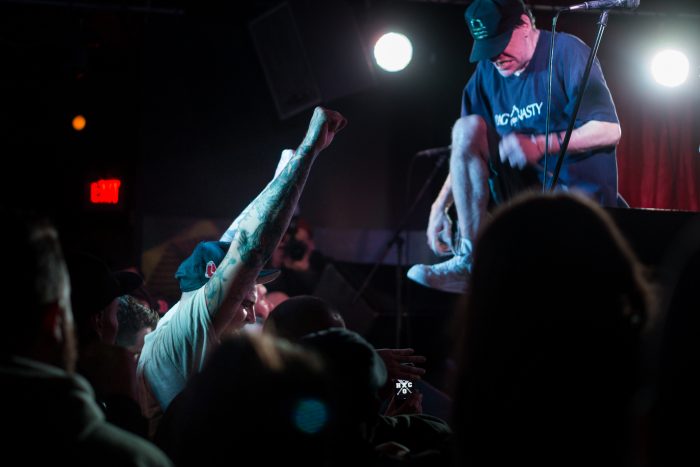
Photo Credit: Avrinder Dhillon




































































































Carmen Avilés
April 12, 2016 at 3:30 pm
Jun Shigemura
Colin Gardner
April 12, 2016 at 6:04 am
Not even going to lie, Bane and Earth Crisis were my life in 1998.